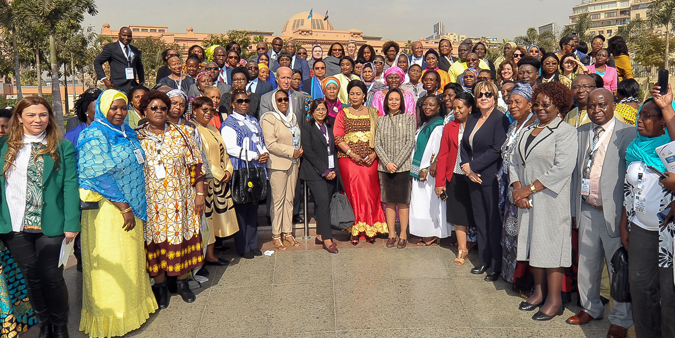African Union calls upon its Member States to prepare for the 63rd Commission on the Status of Women
Date:
This story was originally published on UN Women’s website for the Arab States region.

Over 300 representatives from the African Union Member States came together to participate in the Africa ministerial pre-consultative meeting for the 63rd Session of the Commission on the Status of Women (CSW63) held in Cairo, Egypt, on 5 February 2019.
Convened under the auspices of the African Union and with the support from UN Women, the objective of the ministerial pre-consultative meeting was to draw on the expertise of high-level representatives from governments in the region to elaborate recommendations that respond to the priorities of women and men from the Africa region to achieve gender equality and the empowerment of women and girls. The recommendations that emerged from the meeting will be subsequently taken forward by Member States attending CSW63 in New York in March.
Opening the event, Åsa Regnér, Assistant Secretary-General and Deputy Executive Director of UN Women, thanked Egypt, the host country of the meeting and current Head of the African Union, for its initiative in bringing together such a diverse group of experts and encouraged the participants to make solid commitments to advance women’s access to public services, social protection and sustainable infrastructure. She also referred to the Multi-Stakeholder Forum for CSW63 held during the previous week in New York where recurrent calls were made to increase investments in gender responsive social protection, public services and sustainable infrastructure to free up women’s time, support their mobility, enhance their access to economic opportunities and strengthen their resilience to shocks.
Citing the persistent gender gaps in access to social protection, she said, “women constitute the bulk of the 71 per cent of the world’s population with partial or no social protection coverage” and recalled the central role of public services in reducing poverty and inequality and in advancing the rights of women and girls. She said, “gender-responsive design and delivery of public services offer important opportunities for changing unequal power relations” and insisted that “social protection, public services and sustainable infrastructure must work in tandem to maximize their potential for promoting gender equality and women’s empowerment, and must come accompanied by macroeconomic and labour market policies that enhance job creation and livelihoods”.
Also speaking at the opening, Maya Morsy, President of the Egyptian National Council for Women said, “we believe that there are direct linkages between the implementation of the Agenda for Sustainable Development and the 2063 Agenda. The new African Strategy for the Empowerment of Women and Gender Equality can contribute in setting our priorities and strengthening our strategic partnerships, by maximizing opportunities and inclusion of the social protection systems and the accessibility to public services and sustainable infrastructures for all women and girls.”
Speaking on behalf of Sameh Chokri, Minister of Foreign Affairs of Egypt, Ambassador Ahmed Ehab Gamal El Dine, Assistant Foreign Minister for Human Rights, Social and International Humanitarian Affairs, extended Egypt’s warm welcome to the distinguished participants and his best wishes for a successful meeting leading to a strong unified voice to promote a common agenda for Africa. He also underlined that hosting the Arab and African preparatory meetings back-to-back in the same city, provides further opportunities for sharing best practices between the two regions.
Ghada Waly, Minister of Social Solidarity of Egypt, also greeted the participants with a keynote address on the status of social protection in Egypt, sharing some of the country’s experience and achievements regarding the provision of social protection and safety nets, including the most recent conditional transfer schemes called Takaful and Karama and underlining how inclusive growth and macroeconomic stability are key enablers of social protection.
The Minister also cited the Social Accountability Committees that Egypt has established at the request of civil society organizations to increase transparency and accountability, and noted that that these social protection schemes empower women economically and socially by providing them direct access to cash support. “We believe that there are direct linkages between the implementation of the Agenda for Sustainable Development and the 2063 Agenda,” said Minister Waly. “The new African Strategy for the Empowerment of Women and Gender Equality can contribute in setting our priorities and strengthening our strategic partnerships, by maximizing opportunities and inclusion of the social protection systems and the accessibility to public services and sustainable infrastructures for all women and girls”.
Chantal Lopusa Safou, Minister of Gender, Children and Family of the Democratic Republic of Congo and Chairperson of the Bureau of the African Union Specialized Technical Committee on Gender Equality and Women’s Empowerment, stressed the importance of governments’ commitments to ensure the protection of women and girls. She said, “alone, one can go fast, but together we can go far”, and called on the participants to finalize an outcome document that will “represent our position as spokespeople for those women who still don’t have a voice… The world is moving ahead and women and girls cannot stay on the margin.”
The two-day meeting provides an opportunity for participants to be briefed on the upcoming CSW63 and on the outcomes of the previous sessions, including the organization of the Committee, the members of its Bureau and on the key messages to inform Africa’s technical contribution to the CSW63 Agreed Conclusions. Participants will also discuss and adopt the Africa CSW63 outcome document.